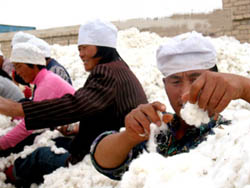| Tools: Save | Print | E-mail | Most Read |
| Cotton Imports Hurt Local Growers |
| Adjust font size: |
According to Tuesday's edition of Economic Information Daily, each of China's nearly 100 million cotton growers earned 200 yuan less a year. Experts warn that if China's growing dependence on imported cotton continues, it will wreak havoc on the national cotton industry and growers' incomes. Statistics show that the growth rate of China's domestic demand for cotton fuelled by the rapid growth of the textiles industry and surging exports, has risen by an average of 10 percent annually since 1998. China's demand for cotton reached 9.4 million tons in 2005, exceeding domestic production by 3.95 million tons. Textile firms turned to imports to meet the demand. At the same time, domestic cotton production was unstable and rose and fell with fluctuations in cotton prices. Guan Ruijie, deputy director of the Agricultural Department of the Xinjiang Uygur Autonomous Region in northwest China, said that last year alone, China imported 2.57 million tons of cotton, which was a third higher than the total cotton output of Xinjiang, the country's largest cotton producer. Customs figures showed China's net cotton imports amounted to 4.14 million tons between January 2001 and August 2005, and the cost of imports hit 6 billion yuan. The National Development and Reform Commission (NDRC) forecast that the shortage could last a few more years, or for about as long as the country's cotton production remains less than consumption. China will still have to import huge quantities of cotton in the next couple of years, the NDRC said. Experts from the US have predicted that China's demand for cotton will reach 12 million tons by 2014, or about half of the world's total output. The Ministry of Agriculture said that cotton growing has become a major industry with income from selling cotton making up one-third of cotton farmers' cash income. The figure is about half or more for Xinjiang cotton farmers. According to industry insiders, half of China's cotton imports come from the US. Cotton subsidies provided by the US government to domestic growers, which is reportedly US$3 billion a year, is a key cause of falling international cotton prices, and this exerts pressure on China's cotton farmers. If this carries on unchecked, cotton growers in Xinjiang will be the most badly affected. Guan suggested that the government help Xinjiang expand its cotton-growing acreage by some 667,000 hectares to increase cotton output, thereby boosting cotton self-sufficiency to around 80 percent and reducing the reliance on imports. With the necessary support from the government, Xinjiang could be capable of turning out 3.8 million tons of cotton a year, or half of China's total, within five years, he said. (Xinhua News Agency March 29, 2006) |
| Tools: Save | Print | E-mail | Most Read |
 |
| Related Stories |
| Product Directory China Search |
Country Search Hot Buys |
